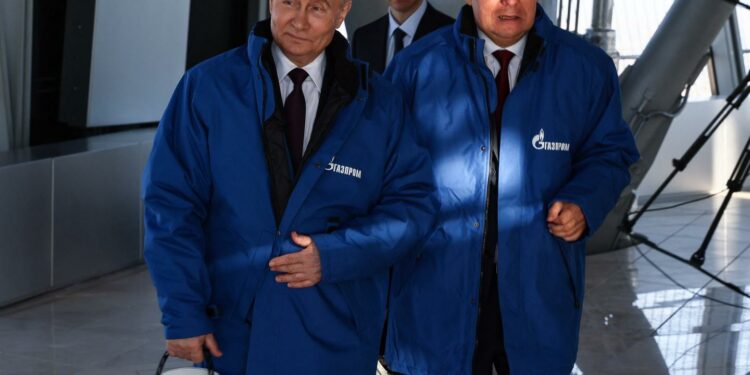It’s one of the major consequences of Russia’s full-scale invasion of Ukraine on February 24, 2022: Europe has had to painfully end its dependence on Russian gas imports, a crucial source of revenue for the Kremlin. Wednesday, January 1, saw the next step in this weaning process. Following Kyiv’s non-renewal of the five-year contract with Russian giant Gazprom, not a single cubic meter of Russian gas now transits Ukraine. In September 2024, this route still carried around a third of Russian imports to the European Union.
Read more Subscribers only End of Russian gas transit through Ukraine puts EU under pressure
This is a highly political decision for President Volodymyr Zelensky. By putting an end to this transit, he is depriving Moscow of €6.3 billion in annual revenues from the sale of this gas to Europe, at a time when the Russian economy is finally taking a beating under the impact of Western sanctions and the financing of the war effort. It also deprives his own country of transit rights, from which it used to earn some €800 million. Nevertheless, the Ukrainian leader sees this closure as “one of Moscow’s greatest defeats,” given Vladimir Putin’s quarter-century of success in wielding the gas weapon against his neighbors. The Russian army has been systematically destroying Ukraine’s energy infrastructure by bombardment, but until now has been careful to spare the pipeline through which Russian gas used to transit.
For Europeans, on the other hand, the situation is not so clear-cut. In September, Russian gas accounted for 19% of EU imports, a definite improvement on the 45% of 2021, but the break is far from complete, with a horizon of 2027. It has been painful for some, particularly Germany, whose economy had become heavily dependent on cheap Russian gas and which had even sought to avoid transit via Ukraine with the construction of the Nord Stream pipeline in the Baltic Sea, now inoperative. Russian gas has been largely replaced by liquefied natural gas (LNG) purchased from other countries, notably Norway and the United States, which is more expensive and requires the construction of special terminals. Russian gas is still imported via the TurkStream pipeline, which crosses the Black Sea, and in the form of LNG.
Slovak prime minister protests
The European Commission was prepared for Ukraine to stop supplying gas and, thanks in part to the level of storage, the event did not cause any major disruption, despite protests from the pro-Russian Slovak prime minister, Robert Fico, who discussed the matter with President Putin in December and accused Ukraine of “sabotage.” The only country in real difficulty is non-EU member Moldova, which neighboring Romania has had to help.
Column Subscribers only “Moscow has not finished paying the price for its ‘special operation’ in Ukraine”
In making the decision to completely sever its gas relationship with Moscow, Ukraine has not only put an end to the paradox of a contract with a country at war with itself. It has also highlighted the slowness of Europeans, some of whom dream only of reopening the Russian gas valves as soon as a ceasefire is in sight in Ukraine, to match their words with their deeds. If they really want Russia to stop its war on Ukraine, depriving it completely of the gas revenues they buy from it is an excellent lever.
Translation of an original article published in French on lemonde.fr; the publisher may only be liable for the French version.
Reuse this content
Source link : http://www.bing.com/news/apiclick.aspx?ref=FexRss&aid=&tid=6777e6aaf1e942288a1519d329c9bae6&url=https%3A%2F%2Fwww.lemonde.fr%2Fen%2Fopinion%2Farticle%2F2025%2F01%2F03%2Feurope-is-weaning-itself-off-russian-gas-too-slowly_6736668_23.html&c=480523176415508786&mkt=de-de
Author :
Publish date : 2025-01-03 02:47:00
Copyright for syndicated content belongs to the linked Source.



